Sarah Maria Medina on THE SEASON OF EARTHQUAKES
Sound like gunfire pops through night—the cathedral letting off fireworks. When I wake, I pull clumps of mud from my hair. It fell from the walls and wove into my unkempt braids. My lungs ache from the dust that falls onto the stone dirt floor. Luz finds a dead bird hit by a firework from the church, its wings spread out in flight. Dark gray. Divinity and I burry the bird in the wild garden. Her small child body bends, her mouth close to the ground. She sings an ancient lullaby. We search for a rock by the river, and place it over the dirt grave. Then we leave behind the mud house: the dust, the humidity, the water lilies that survive the garbage flooded river.
The freeway long between Mexico City and the mountain town, we pass through Veracruz in Luz’s truck, roll the windows to the air that brings back Havana and San Juan. Luz prefers the cold mountain air, but I turn to inhale what could only be called the past: Dolores on the hill above Marianna, closing her eyes to the heat.
Luz turns up the radio, the famous Mexican drug cartel leader, Chapo Guzman, caught and jailed. And then Luz says we can no longer be together. Divinity asleep in the back, my face salt wet to the wind. There is too much to hold between us: the violence of our childhoods, constructed walls between our countries, children lost in the desert, their bones found later, the child with the swollen chin outside the pharmacy, mountain peyote ceremonies, the city where Luz runs against neon lights.
In la Roma, we bail below starved city trees, and climb four flights to Luz’s rooftop maid’s quarter. I sleep next to Divinity in the second room. City sounds enter through broken glass windows.
Fevered from the break up but also from the mud dust that I can’t shake, I listen to night: the constant rush of the freeway, neighbor dogs, the screech of the tortillería, screams of ambulances and police trucks, the printing press on the first floor. And then I dream an earthquake, the apartment shaking four stories high.
“Soñé que hubo un terremoto.” I confide my dream to Luz.
She nods, pauses as if looking at an internal weather chart. “Sí, pienso que vamos a tener uno pronto.”
Tension runs like electric chords through my fingers. I drink my coffee, looking out through the open door to the billboard: a woman in a light blue dress, her lips painted black. Luz has never been afraid of my dreams, which sometimes come true. She holds them up to me, says yes, and continues with the morning. I cough, dress my tired body, and make my way down the stairs to the whining tortillería.
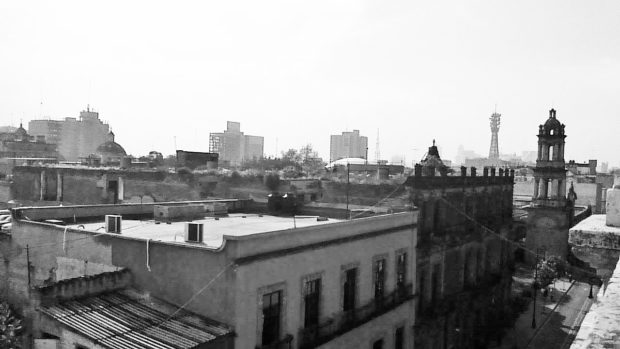
A waterless fountain occupies the center of the plaza. Dust and leaves covering its miniature blue tiles. We try not to stare at the building across the street, the white four-story edifice, perfect in its simplicity. I turn to watch the sparrows instead. Divinity counts them on her fingers, follows their path.
“Claudia ya está en casa. Vi una de nuestras amigas.” Luz’s voice deepens from her already soft scratch. She touches a red ruby fabric folded over her forehead like a barrio crown. It belonged to Claudia’s grandmother.
I turn my head, my back to the white building, but I don’t see Claudia’s light milk freckled face, or her pale hands closing the door. I would recognize her from the photos of the monarchs that Luz showed me—them in the forest swimming in golden butterflies. Claudia and Luz’s lips pressed together, gold heavy monarchs drowning their arms.
“Ella está alquilada?” I wonder how she affords rent in this barrio, one over from where Luz rents.
“No, su padre se lo regaló.” I imagine her father handing his poet daughter keys to the building, giving her security in her world of poetics and depression.
I scuff my gray moccasin boots over the concrete. My chest still feels heavy; the dust from the mud house resides. Luz stretches out her tight jeaned legs next to me, her long black braid coming unraveled.
“Mira, si Claudia camina pa’cá, la saludamos, no?” I foretell the possibility of Claudia walking past in the plaza.
“No, yo no le hablo.” Luz scowls at the thought of introducing us. She squints into the bright sky, scowls into the crack of concrete below her high-top yellow and turquoise Adidas.
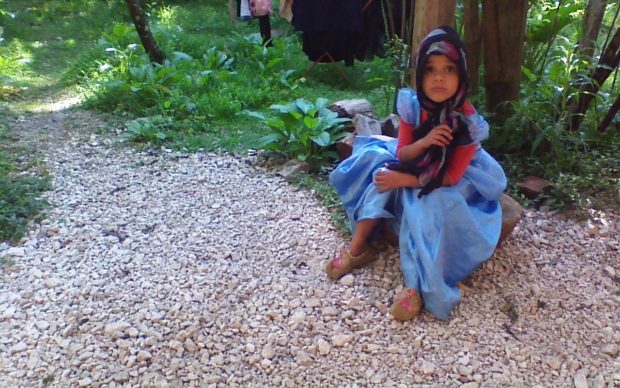
I wake in the middle of the night with a pain that doubles me over. I can’t walk. I yell for Luz from the trundle bed. She huddles below my bent over body—carries most of my weight. We make our way across the rooftop to the outdoor bathroom, but halfway there, an inescapable heaviness pulls me to the floor. I hear Luz yell as the sky closes in around me.
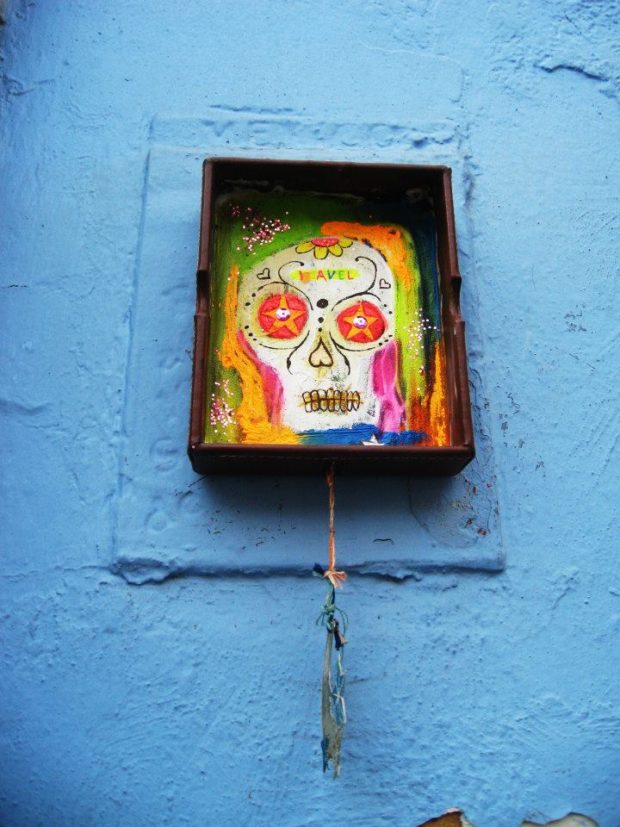
Divinity howls in Luz’s arms from the plastic seats in the hospital waiting room and I promise her I’ll be back soon. The nurse pierces my arm with a needle. I try to make sense of my surroundings. The nurses dressed from the forties: hair hidden in different colored cloths, turquoise or hot pink, then tied into a bun at the nape, white dresses and on the sleeve, a red cross.
I beg to keep Luz’s electric blue down jacket, pull it over me like a blanket; it covers the white hospital gown that shows my bareness. A doctor on rotating duty tells me that the bacteria from my lungs travelled. I try not to beg too often for water, but I do beg, often. Morning light filters in through the closed window above the bed when Luz and Divinity collect me from the hospital.
In the apartment, a fever rises inside Divinity now. I spoon sweet syrup antibiotics into her small mouth. The day moves slow around us, tending fevers my greatest duty. I run a cool washcloth over her high forehead. An exhaustion slows my hands as I return each cool cloth to her fever.
The room fills with a giant sound. Everything moves around me.
“Està temblando.” Luz’s voice moves fast between the sounds.
I wrap Divinity’s nakedness in a light green sheet, pull her heavy fevered body into my arms, and find the rooftop outside. It sways back and forth and the loudness takes over outside. Leonardo, the poet mathematician, limps from his room. Leonardo’s hand on my shoulder, his repeated unorthodox prayer and Divinity’s heavy swollen eyes staring up at the bright sky. “Va estar bien, va estar bien.” The roof rolls across the dry waves of the shifting earth. It’s like a ship, and I’m used to ships and waves, used to feeling the call of survival—that was my childhood—surviving sea and rivers, surviving the unexpected which usually came in the form of a man and a whiskey bottle. I burry my head to Divinity, hold her tight in my arms. Then silence comes. Leonardo’s prayer stops. Just the city earthquake alarms and car alarms now.
I notice that Luz brought a mattress outside. She shrugs when I ask. “I thought we could land on it.”
We rush down the old stairwell and our neighbors in various forms of undress stand on the cracked sidewalk, waiting for aftershocks, caught in banter about whether it’s safe to run down moving staircase. Stairs are like collapsible accordions, I think, shoving the toe of my boot into a line of weeds that creep from the edge of the curb.
When the earth settles, we climb the stairs, past the neighbors’ barking dogs, and the nested treetop sparrows. Nights and antibiotics, we follow the electronic chart of earthquakes that move between meridians. I wait for another dream, but wake throughout the night.
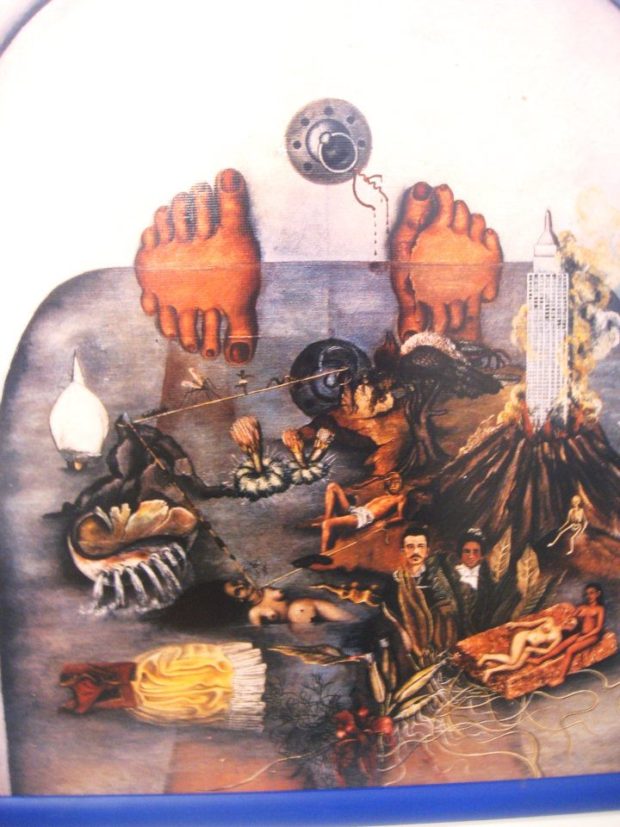
“Mama,” Divinity reaches her hand out from the backseat. “I want a bracelet like you have.” My white paper hospital bracelet. Between the hospital, the earthquake and her fever, I had forgotten the bracelet. It looks like a worn fortune from a Chinese cookie: A hope this doesn’t happen to you. An only one paper fortune. A protection that we won’t need a second hospital band. I take it from my wrist, and slide it over hers.
A man plays harmonica on the corner, begs pesos from off-key breath blows. I lean against the window. Luz turns out across the lanes of traffic, and we pass by the street where she always rolls the windows up automatic, a click of the door lock, men leering and auto shops with tire rims gleaming. Tires and stacks and oiled greased hands, dry mouths that shout as we cruise down. Then the movie theatre with the glowing lights, a narrow street, which gives way to the freeway, where police ride in the back of pickup trucks, machine guns pointed at traffic. We turn right, a block from the freeway, slow to our tree lined street.
Luz shoves the key in the ancient lock, moves it up into the click, and we step over discarded glossy newspaper coupons. We climb the cockroach haunted stairs to the apartment. Luz opens her Mac laptop, sinks into the softness of her bed. I wipe sweat from my skin, lean against the kitchen countertop. I think of the monarchs in Valle de Bravo, their migration from the States to Mexico compromised, threatened extinction from thinning forests. Luz asked me to drive out with her before their season of migration ends. I think of her and Claudia in a sea of them. I know we will never go together, that even though I stayed longer because of the fevers, that this is what letting go looks like: fevers and earthquakes.
I sense the building move again, brace my hand against the wall for an aftershock, but realize it was just the wind, or the metro a few blocks down.
I knock on Francisco’s door, the third floor poet, the landlord’s son with the printing press downstairs. He pushes his glasses back against the frame of his nose, as we look out the window from his living room. He says the aged Coca-Cola bottle on the scaffolding replaced a Corona bottle that glowed. He misses the neon.
Francisco lets us shower in his bathroom; he keeps his gas heater outside on the balcony in case of leaks, a subconscious fear of death from gas breaks in the night, like the poet Zarathustra and his girlfriend who never woke from his bathtub after a night of drinking and poetry. Francisco’s windowpane broken, old jeans create a barrier from the family in the building across the street. I’m thankful for the decadence of this old tiled bathroom with a proper shower and hot water—even if we count minutes. In the mud house we heated water by making a fire below the bathtub in the garden.
Divinity and I cross the hardwood floor in the living room with 1920s light fixtures and antique glass tanks with fish stolen from Southern rivers. Their wild blue and gold colors still shine in the dirty water.
We stand at the neon tanks, discuss poetics, and the stolen water from Native communities that still leaves the city dry. Sometimes I want to stay, escape the small corners of the upstairs apartment, the scowl and cloud of smoke that filters out from the closed door of Luz’s office. It’s time for us to leave soon. Our fevers tempered. The earth no longer trembling. I linger over the sad trapped fish.
“Do you think they noticed the earthquake?” I ask as Divinity stands still watching their swim, their fins winging through water.
Francisco shakes his head, pushes his glasses back, and runs his fingers through his short unwashed black hair.
Once Divinity sleeps on the trundle bed, I knock on Luz’s bedroom door. Her television blares notices on earthquake season. Sirens scream from the television, and sirens whine on the street outside her broken windowpane. A pink sheet hangs over the frame, and I open the window, lean out over the street. The saxophonist stayed home, or breaks the soles of his shoes against another sidewalk.
When Luz pulls off her jeans, she wraps her thin arms around my shoulders. I forget the monarchs we’ll never see. I forget her ex-girlfriend’s name. Luz’s mouth presses against mine. “Me sientas Chiquita,” she whispers.
I lace my fingers through her braid, careful not to touch her ears. They are like seashells: small and perfect. Her father took her to the sea, when he was working in a sea town as a doctor. They had moved from the cold mountains for a year. Her pale güerita skin burned from the sun; the ocean salt licked her sores. Her father took her into the giant waves, loud, burning, the salt almost like the sun. Her mother says it never happened. He held her under the waves. His hands strong against her child shoulders. Her small hands searching for her ears, covering her ears, a giant pressure against her eardrums, further down, and then they exploded into her small jawline.
I rest my tattooed fingers against her fine jawbone, kiss her swollen lips, her small nose, uneven from two breaks. I unwind her thick braid that has grown to her shoulder blades. I whisper into her once broken ears, “Te quiero.”
The sound of sirens fades from the television. Francisco in the apartment below plays electronic music. Sad and whining, it comes up through the wooden floorboards. When Luz falls asleep, I make my way out to the roof. The tamale vendor’s calls fill the barrio—a lonely echoing that pulls at my chest.
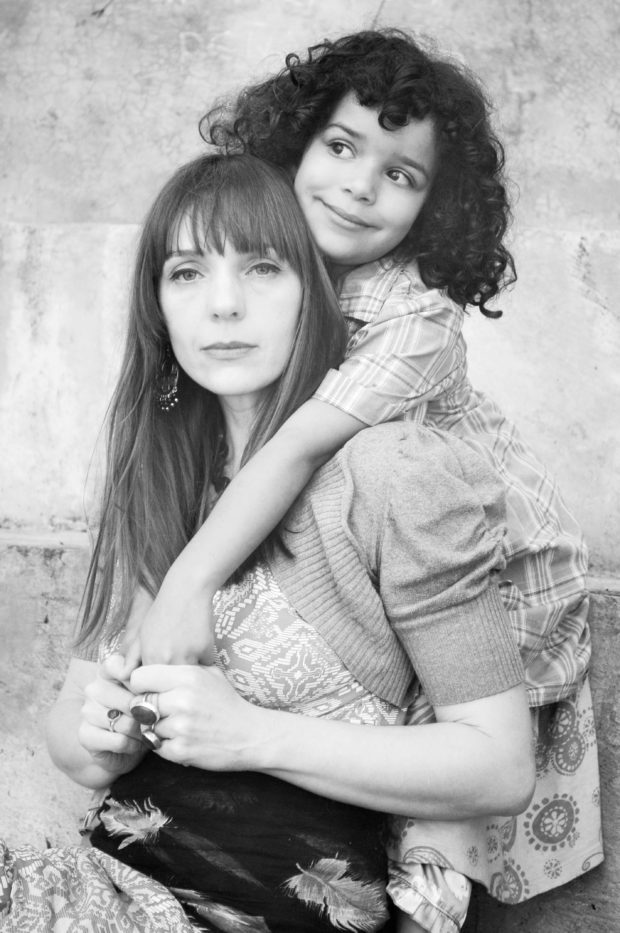






One Response to Sarah Maria Medina on THE SEASON OF EARTHQUAKES